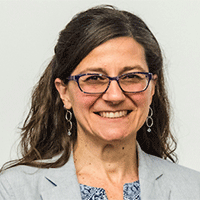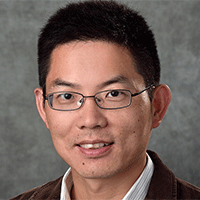DSCC Talks
Plenary 1: October 5th – 10:00AM
Speaker: Dr. Anna Stefanopoulou
William Clay Ford Professor of Technology
Department of Mechanical Engineering
University of Michigan
Title: The price of battery degradation and the value of battery health estimation in the transition to electrified transportation
Abstract: Replacing a gasoline or diesel internal combustion engine vehicle (ICEV) with an electric vehicle (EV) will zero out the tailpipe emissions and depending on where it charges can have 50% lower green-house gas emissions. Key barrier to EV adoption is the higher up-front cost of EVs compared to ICEVs. Using transit buses, we will show how the total cost of ownership depends on the lower operating cost due to fuel and maintenance savings that depend on the route, utilization, and charging of the vehicle. If the battery stays healthy, vehicle to building, vehicle to grid, and other 2nd life applications can provide additional value streams and be considered as a long-horizon optimization problem.
The battery state of health (SOH) is thus at the crux of the payback calculations and consequently can tip the EV adoption. Unfortunately, estimating the battery health with high confidence can only be done under certain discharge patterns. Identifying the physical origin of the degradation is even more difficult but very important, because it can inform the battery management system and hence prevent further degradation. We will present various on-board signals for tracking the intrinsic “aging wrinkles” in batteries. We will conclude by highlighting the estimation of gas venting and assess the intensity of thermal runaway for first-responders and post-accident management of damaged batteries. This presentation will be similar to the one presented in IEEE ECCE and ICCAS.

Bio: Prof. Anna Stefanopoulou, is the William Clay Ford Professor of Technology and the Director of the Energy Institute at the University of Michigan. Stefanopoulou joined the Department of Mechanical Engineering in 2000 after working at the University of California, Santa Barbara and in the automotive industry, where she developed algorithms and calibrations for highly efficient and a dvanced powertrains. Stefanopoulou is currently working with a multidisciplinary group to knit automotive and manufacturing expertise with battery and grid experts with the goal to realize a clean electrified transportation.
She is in the fellow rank of three of the largest engineering societies (IEEE, SAE, ASME). Her innovation in powertrain control technology has been recognized by multiple awards and has been documented in a book, 21 US patents, 340 publications (8 of which have received awards) on estimation and control of internal combustion engines and electrochemical processes such as fuel cells and batteries. Stefanopoulou also has co-authored influential reports on the cost effectiveness of fuel-efficient technologies for light-duty vehicles, sponsored by the National Academies, to help inform policymakers.
Plenary 2: October 6th -10:00AM
Speaker: Dr. Xiaobo Tan
MSU Foundation Professor & Richard M. Hong Endowed Chair
Department of Electrical & Computer Engineering
Department of Mechanical Engineering
Michigan State University
Title: Robotic Fish: Make "Sense" of the Underwater World
Abstract: Bioinspired robotic fish have gained widespread interest due to their natural appeal and promising prospect for underwater sensing. In this talk I will share our robotic fish work, from lab research to field experimentation. I will focus on gliding robotic fish "GRACE", which combines maneuverability of robotic fish with energy-efficiency of underwater gliders. I will highlight the roles of dynamics and control in advancing the goal of autonomous sensing, through a series of examples motivated by applications of practical relevance: exploiting spiral dynamics of GRACE to monitor harmful algal blooms, developing distributed filtering algorithms to track movement of invasive fish species, and facilitating human-robot collaboration in underwater search and rescue.

Bio: Dr. Xiaobo Tan is an MSU Foundation Professor and the Richard M. Hong Endowed Chair in Electrical and Computer Engineering at Michigan State University. He received his bachelor's and master's degrees in automatic control from Tsinghua University, Beijing, China, in 1995, 1998, respectively, and his Ph.D. in electrical and computer engineering from the University of Maryland in 2002. His research interests include underwater robotics, soft robotics, smart materials, and control systems. He has published about 300 papers and been awarded four US patents in these areas.
Dr. Tan is a Fellow of IEEE and ASME. He was a recipient of the NSF CAREER Award (2006), MSU Teacher-Scholar Award (2010), MSU College of Engineering Withrow Distinguished Scholar Award (2018), Distinguished Alumni Award from the ECE Department at University of Maryland (2018), and multiple best paper awards. Dr. Tan is currently a Senior Editor for IEEE/ASME Transactions on Mechatronics (TMECH), and has served as an Associate Editor for Automatica, Technical Editor for TMECH, and guest editor for six journals. He has been on the organizing committees for a number of international conferences, including serving as the General Chair for the 2018 ASME Dynamic Systems and Control Conference. Dr. Tan is keen to integrate his research with educational and outreach activities, and has served as Director of an NSF-funded Research Experiences for Teachers (RET) Site program at MSU from 2009 - 2016 and Curator of a robotic fish exhibit at MSU Museum in 2016-2017.
Rufus Oldenburger Lecture: October 6th – 11:00AM
Speaker: Dr. Mark Spong
Professor of Systems Engineering
Professor of Electrical and Computer Engineering
Excellence in Education Chair
Erik Jonsson School of Engineering & Computer Science
University of Texas at Dallas
Title: Life in the Underactuated Lane
Abstract: Underactuated mechanical systems are those with fewer actuators than degrees of freedom and arise in several applications including flexible-joint and flexible-link robots, gymnastic robots, as well as walking, flying, and swimming robots. In addition, the relatively new area of soft robots presents new challenges and opportunities for control of underactuated systems. Various tools have been applied to control underactuated systems, such as static and dynamic feedback linearization, partial feedback linearization, and passivity-based control. In this talk I will present several results that my students and I have obtained for flexible-joint robots, gymnastic robots, and other systems, and discuss how these ideas may prove useful for controlling soft robots.

Bio: Mark W. Spong received his doctorate degree in systems science and mathematics in 1981 from Washington University in St. Louis. He has held faculty positions at Lehigh University (1981-82), Cornell University (1982-84), and at the University of Illinois at Urbana-Champaign (1984-2008).
He is currently Professor of Systems Engineering, Professor of Electrical and Computer Engineering and holds the Excellence in Education Chair at the University of Texas at Dallas. From 2008-2017 he was the Dean of the Erik Jonsson School of Engineering and Computer Science at UT-Dallas. He is also Donald Biggar Willett Professor Emeritus from the University of Illinois at Urbana-Champaign.
Professor Spong is Past President of the IEEE Control Systems Society and past Editor-in-Chief of the IEEE Transactions on Control System Technology. He is a Life Fellow of the IEEE and a Fellow of IFAC.
His main research interests are in robotics, mechatronics, and nonlinear control theory. He has authored or coauthored more than 300 technical articles in control and robotics, five books and holds one patent. He has made fundamental contributions in robust and nonlinear control of robot manipulators, teleoperators, bipedal walking robots, and multi-robot systems.
Professor Spong's notable awards include the 2020 Rufus Oldenberger Medal from the ASME, the 2018 Bode Lecture Prize from the IEEE CSS, the 2016 Nyquist Lecture Prize from the ASME, the 2011 Pioneer in Robotics Award from the IEEE Robotics and Automation Society, the first IROS Fumio Harashima Award for Innovative Technologies in 2007, the IEEE Transactions on Control Systems Technology Outstanding Paper Award, the Senior Scientist Research Award from the Alexander von Humboldt Foundation, the Distinguished Member Award from the IEEE Control Systems Society, the John R. Ragazzini and O. Hugo Schuck Awards from the American Automatic Control Council, and the IEEE Third Millennium Medal.
Plenary 3: Nyquist Lecture: October 7th – 10:00AM
Title: Haptics: A Hot Topic with Controls at its Core
Abstract: We depend on touch-based, or haptic, information throughout our daily activities, even in ways that we do not consciously realize. Given the importance of this sensory channel, haptic feedback is becoming commonplace in consumer electronic devices and advanced robotic systems. From simple smart watch vibration notifications to state of the art full body haptic displays in virtual reality games, the potential for our sense of touch to enhance information transfer and realism is clear. What is “under the hood,” making realistic haptic interactions possible? Feedback and stability are critical concepts, central to realizing high-fidelity haptics. These concepts also play out in the applications of haptic guidance, virtual environment-based training , and rehabilitation robotics that have shaped my own research. In this talk, I will discuss the fundamental concepts in dynamic systems and controls that are at the heart of these haptic interactions. I will also share how the dynamic systems and controls community launched the field of haptics, and the need for our continued engagement in the field going forward.

Bio: Marcia O'Malley is the Thomas Michael Panos Family Professor in Mechanical Engineering, Computer Science, and Electrical and Computer Engineering at Rice University where she directs the MAHI (Mechatronics and Haptic Interfaces) Lab. Her research addresses issues that arise when humans physically interact with robotic systems, with a focus on training and rehabilitation in virtual environments. She is a Fellow of both the American Society of Mechanical Engineers and the Institute of Electrical and Electronics Engineers. She serves as a senior associate editor for the ACM Transactions on Human Robot Interaction and the IEEE/ASME Transactions on Mechatronics, and as co-Editor in Chief of the IEEE Transactions on Haptics.